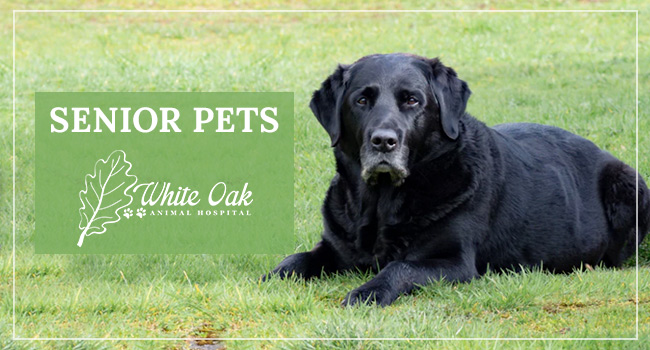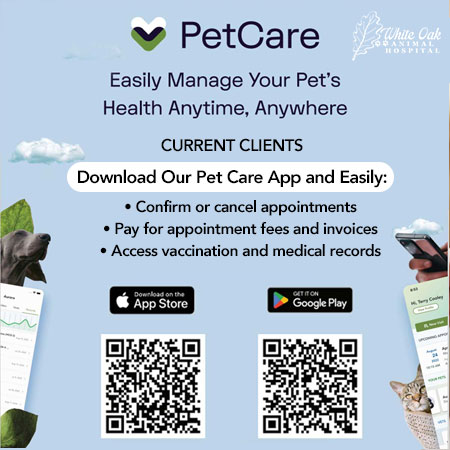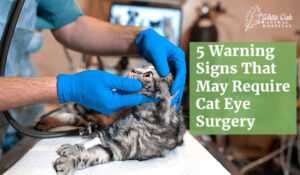
Hi! My name is Chelsea. I’ve been Dr. Damron’s vet tech for several years now.
My first real dog came into my life around 5 years ago.
I can still remember the day my husband walked in after work, 15 pounds of trembling German Shepherd puppy in his arms. Remington had hidden under the seat of the truck the whole hour home. I’m not quite sure if my squeals of excitement were comforting, or terrified poor Rem even more.

When it came down to writing this page, I’m not going to fib and tell you I knew exactly what to convey here.
Sure, I see many senior pets at work every single day. I’ve discussed arthritis, renal failure, diabetes, and other diseases countless times with owners.
Sadly, I have helped many owners say goodbye to their old friend, more times than I care to remember.
As I sat in bed, scratching Rem’s graying muzzle, I started thinking about his overall health. I would honestly consider him to be in his prime at 5 years old. He’s NEVER had health issues. Nothing shy of a broken dew claw at least. After all, he isn’t really a “senior pet” until the age of 7 in the vet world.
However, there are a couple of lumps that have popped up in the past few months I want Dr. Damron to check out. I’ve been noticing his eyes looking a bit more cloudy than normal. And, now that it is on my mind, I should probably start him on a glucosamine supplement soon.
Then it hit me.
NOW is the time to do something. NOW is when preventive care should start.
If the diseases of old age are preparing battle against my dog, I’m coming armed with good veterinary medicine.
Our goal here at White Oak is to arm you, the reader, with all artillery possible.
Because, it is not always about getting behind the problem, but in front of it.
Get Physical.
A physical exam, that is!
You would be amazed to know how much information your veterinarian can obtain by doing a physical exam on your senior pet. We recommend it yearly at the least. Possibly twice a year depending on the condition of your pet.
Heart and lung sounds, heart rate, lymph nodes, joint mobility, body condition score, temperature, etc. All of these things (plus some) stem from a routine physical. All of these things play a major part in your pet’s life, too.
I cannot tell you how many times I’ve been told: “I don’t need to see the doctor this year, everything seems to be fine with Fifi.” While this may be true, it’s still a good idea to let the vet look them over once a year. Should anything happen to your pet down the road, having a solid history of physicals to look back on can be very handy for your veterinarian.
And by all means, form a relationship with your veterinarian! One thing I can assure you is good medical guidance stems from loyalty. We try to give 100% to all of our clients and patients. However, when someone uses 5 veterinarians simultaneously, diagnosing and treating becomes 5 times harder.
Blood work. Does work. (Especially for Senior Pets!)
Whether it is diagnostic or screening blood tests, both typically go hand-in-hand with our senior pets (not to say young pets never need blood work)!
 When the physical exam checks out and all symptoms are noted, blood testing is a doctor’s best friend. Especially when diagnosing a sick animal. After all, describing their ailments in a language we understand is not their forte.
When the physical exam checks out and all symptoms are noted, blood testing is a doctor’s best friend. Especially when diagnosing a sick animal. After all, describing their ailments in a language we understand is not their forte.
Questioning why your veterinarian makes you do blood work for Duke’s arthritis medicine?
Don’t.
I promise you it’s for your pet’s well-being. Unfortunately, many long-term medicines have some pretty heavy side effects. Many of which have the potential to compromise vital organs. Your vet is simply keeping an eye on the stuff your pet cannot live without.
Furthermore, just like humans, our pets’ bodies change every day. Blood work done six months ago won’t necessarily match blood work done today.
Just ASK!
Senior pets and their complications come with lots of questions. We understand and we are here to answer all we can.
Our job is to equip you with all of your options and somewhat of an illustration of the road ahead. Furthermore, we’re here to educate you, not judge you! We fully believe a good vet-client relationship comes with honesty and transparency…from both sides!
“Maybe there is an alternative to the medicine Rascal is taking daily.”
“What if there is another procedure the doctor could try before repairing Suzie’s torn cruciate ligaments by surgery.”
“I can’t afford all of this!”
Just ASK! That’s why we are here!
Knowing when to say goodbye.
This is probably one of the toughest questions any pet owner will face with senior pets. It is by far one of the hardest questions we are asked as veterinary professionals.
Our biggest hope as pet owners is that our pets will go peacefully on their own. Or at least find some way to communicate to us they are ‘ready’.
Sometimes this is the case. Other times, however, it’s not an easy answer.
Our best piece of advice on this subject is to evaluate their quality of life. Is she eating and drinking sufficiently? Can he go to the bathroom on his own? Is she maintaining her weight? Is your pet happy?
From a medical standpoint, we can help guide you. But ultimately, you must be the one to make the decision.
And we are here to stand behind you every step of the way.





